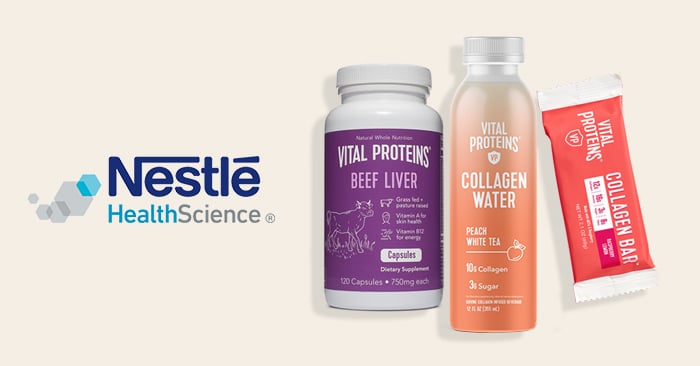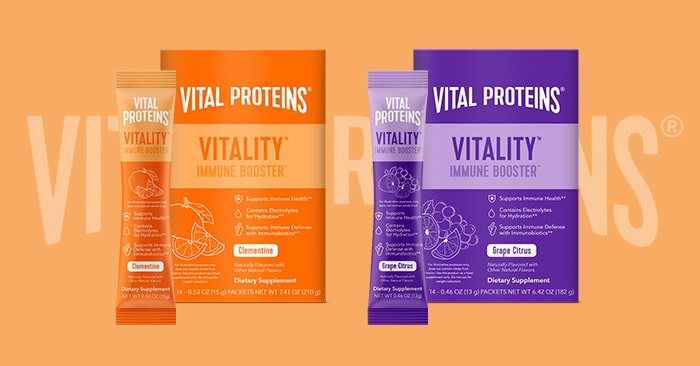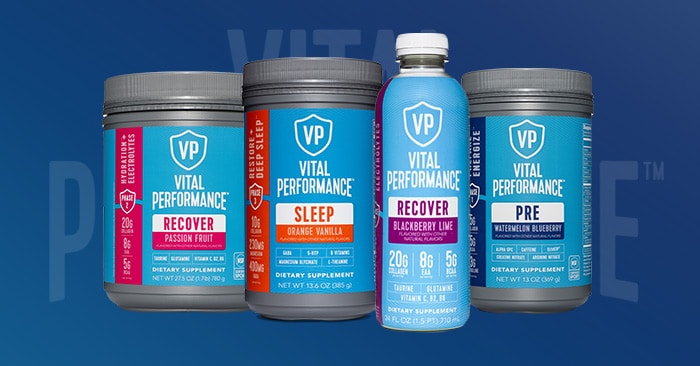Nestlé Health Science Eats Up Vital Proteins

Nestlé HealthScience (NHSc) announced yesterday that it had acquired the majority of collagen-focused function food and supplement brand Vital Proteins.
The terms of the deal were not disclosed but Vital Proteins will remain a standalone entity and continue to operate out of its Chicago headquarters. Founder Kurt Seidensticker will remain on with the company, continuing to manage the business as CEO. As part of the sale, NHSc will also acquire Vital’s 180,000 square-foot manufacturing and distribution center in Chicago.
Vital previously raised $19 million in November 2017 from CAVU Venture Partners. As part of this transaction, CAVU has exited the business, with Seidensticker buying back CAVU’s rollover shares as part of a minority investment he will continue to hold in the brand.
The company’s line of 150 bars, shots, enhanced waters, powders and supplements first were sold online, but in the seven years since the company started it has expanded into 35,000 retail doors including Whole Foods Market, Target, Costco, Walgreen, Kroger and Sprouts.
Part of the motivation to explore a sale, Seidensticker said, was to support further expansion into new channels and geographies — particularly Asia and Europe.
“I saw the opportunity globally that the rest of the world might [be] three to five years behind where the US was on ingestible collagen,” he said. “As we try to look at global expansion it becomes more challenging without a strategic partner like Nestlé. I started to think about if we want to bring wellness to the world, having a resource like Nestlé will help us achieve that goal.”
The company began exploring a sale at the end of the fourth quarter last year, with discussions beginning in earnest with NHSc less than two month ago. Seidensticker added that he has considered selling the company for a few years but said “one of my challenges was that I was never quite ready to make that transition.” The ability to run Vital as a standalone entity assuaged that concern, he said, along with NHSc’s knowledge of food, beverage, and supplements.
Nestlé Health Science’s portfolio is a mix of consumer-facing brands like Atrium Innovations, Pure Encapsulations, and Persona, as well as many brands sold into the medical channel.
NHSc acquired Atrium Innovations, which counts the Garden of Life brand in its portfolio, in 2017 for $2.3 billion. During 2019, Nestlé divested itself from several food and beverage brands, and on a February 2020 call with investors, Mark Schneider, Nestlé S.A. CEO hinted that this was in preparation for acquisitions to come. The company, he said, was looking to acquire “higher growth, higher margin” companies – pointing to Atrium Innovations as one such past example.
“They’re more on trend, more in tune with younger, more affluent consumers. They’re more premiumized products.” Schneider said, “They also make better use of digital opportunities and personalization.”
Although Garden of Life has a sports sub-line and Atrium also includes the Kleen Athlete line of supplements, none have the same brand awareness and brand positioning as Vital Proteins, Greg Behar, CEO of NHSc, said. Kleen Athlete, for example, is aimed more at professional athletes or teams and, as a result, has a smaller footprint
“There are not that many very successful brands that fit our vision and that have the same passion, solid base and quality we are looking for,” Behar said. “Performance has been a small part of our portfolio… [but] this is an area where we believe that science and innovation can bring a lot of benefits and there is still a lot that can be done.”
Furthermore, he noted, consumer testing showed that shoppers were particularly interested in the benefits of bovine collagen and could easily latch onto the concept. While the ingredient is largely positioned as beneficial for joints, mobility and beauty, Nestlé also sees further expansion around gut health messaging as well as combining it with other performance-focused (and scientifically-tested) ingredients.
The global company also wanted a brand that had proven ability to execute from concept through commercialization and sales. For example, Vital Proteins launched its new immunity product into 8,500 Walgreens locations this week — a product that it only first began to work on in earnest in February. The development process, Behar said, can be sped up even further once Vital has access to the NHSc R&D teams.
“There are few brands that have been able to bridge from the supplement positioning to a broader usage,” Behar said. “I think they have shown that ability and there’s a lot we can do with that… I would not undertake the same trajectory for that many brands in the Nestlé Health Science portfolio.”


















